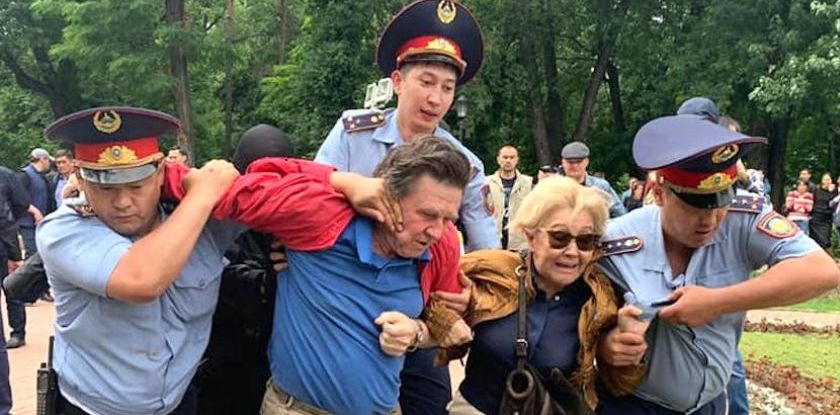The appeals of the protesters arrested in Kazakhstan on June 9-10, 2019, were reviewed at “out-of-court” trials. And on the premises of special detention centers, at that. Was this legal? Kazakh human rights activist Evgeniy Zhovtis believes that it was not.
We review the events that took place in Almaty and Nur-Sultan on June 9 and 10, 2019, in the article called “A Long Night After the Elections” (text available in Russian). According to human rights activists, more than a thousand people were arrested on these days. Of those, 957 got administrative penalties. 670 people got 6-15 days jailtime. And on June 14, 2019, their appeals were reviewed on the premises of the same detention centers in which the people were being held.
Meanwhile, Director of the Kazakhstan International Bureau for Human Rights and Rule of Law Evgeniy Zhovtis believes that this kind of “out-of-court” trials contradict not only the principles of the international law but the principles of the Kazakh law as well.
- As we learned two hours ago (the comment was written on June 14 – kz,expert), the sessions of the appellate bench of the Almaty Municipal Court related to the reviewing of the appeals of the people placed under administrative arrest following the protest meetings of June 9-10, 2019, will be conducted on the premises of the same special detention center where the arrested are being held.
Note that, in many cases, the initial court sessions were conducted on the premises of the police departments where the arrested were being held at that moment.
Apart from the fact that this kind of “out-of-court” trials directly contradict a number of the principles of the international law including publicity, justice equality, etc., they do not adhere to the principles of the Kazakh law, either.
General Comment #32 to Article 14 on justice equality and the right to justice of the UN International Covenant on Civil and Political Rights ratified by the Republic of Kazakhstan as part of our national law does not contain any stipulation that allows for the possibility to hold trials outside of courtrooms. This has to do with the fact that, following the principle of the division of power, the judicial authority is independent from the executive authority and cannot conduct its sessions on the premises in which criminal and administrative proceedings are executed.
Moreover, according to Clause 9 of the said Comment, article 14 includes the right to justice in regard to any kind of criminal accusation and to determining the benefits and burdens in any kind of civil proceedings. The right to justice must be guaranteed universally not to allow for the possibility of depriving anyone of this right.
According to Clause 13 of the Comment, the right to equal protection ensures the equality of competitive abilities. This means that the same procedural rights must be guaranteed to all the parties involved (unless indicated otherwise by the law) in order for the accused not to be placed in a disadvantageous position and not subject them to any other injustice.
And, according to Clause 28 of the Comment, all criminal trials and civil proceedings must be conducted orally and be open to the public. Publicity ensures the transparency of a court procedure and secures the interests of individual parties as well as of the civil society as a whole.
Neither the Criminal and the Civil Code of Judicial Practice nor the Code of Administrative Offenses of the Republic of Kazakhstan does contain any article regulating out-of-court proceedings. Moreover, all these documents stipulate that judicial trials must be held in courtrooms located in halls of justice.
Holding trials on the premises of police departments or special detention centers violates the principle of separation of powers since these trials are conducted on the territory of the executive branch agencies.
It violates the principle of publicity since, as secure settings, police departments and special detention centers are closed to the public and the media.
It violates the principle of justice equality since these trials are conducted on the premises of police agencies that hold detainees administratively liable.
All of this is a direct violation of the international standards for fair judicial proceedings.
We can only wait until criminal trials will be held on the premises of detention centers en masse since there have already been individual extremism and terrorism trials conducted in such a way. All civil proceedings can be conducted in the home of one of the interested parties (if we are talking about physical bodies) and, as for legal bodies, they may be conducted in the office of one of the interested parties. Halls of justice may be reorganized to be used for other purposes.
In regard to administrative trials, such practice, without a doubt, will affect the international agencies’ evaluation of Kazakhstan’s rule of law, independence of justice and investment prospects by in an extremely negative way.
Video on how they arrested protesters in Kazakhstan




